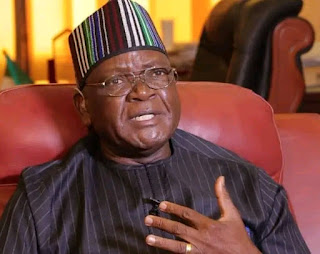Corruption’ll drive away investors unless tackled –Jimoh Ibrahim
Billionaire businessman and politician, Barrister Jimoh Ibrahim, yesterday said no
nation would do business with Nigeria with the current high level of corruption in the country.
Barrister Ibrahim disclosed this while delivering a paper entitled: “Nigeria’s economy: The roles of worshippers in the temple of justice”, at an event organised in honour of Emeritus Prof. David Ijalaye by the Quintessential Equity Chambers, Obafemi Awolowo University, Ile-Ife.
The renowned businessman, who berated judges in whose homes local and foreign currencies were recovered recently, noted that no country would want to do business with Nigeria if the level of corruption was not reduced.
He said: “One of the judges was said to be keeping N54m in his bedroom, others N137m and 20,000 pounds.
“Even we that borrow money to do businesses can’t afford to have such luxury of money in our homes.
“I think this is complete madness and things must be set straight. Such situation is unacceptable.”
According to him, challenges of weakened economy facing the country have presented her opportunity for growth, urging the country to emulate Iran.
“For instance, Matthew Spivack (2016) once maintained in respect to Iran; ‘This slow pace of a weakened economy, political tensions, market uncertainty, and the lingering effects of sanctions, Iran remains an important opportunity for multinationals in emerging markets’.
“Nigeria must think outside the box to improve her revenue as the oil price plummeted.
“Sylvia Ann Hewlett, Melinda Marshall and Laura Sherwin (2013) posited ‘diversity unlocks innovation’ and if this is done, microeconomic stability can be achieved.
“Otherwise, the projections of the World Bank/IMF of Nigeria becoming the 9th biggest economy in 2050 will remain a dream.
“The Nigeria economy is characterised by instructional void. Her economic prosperity is denied by corruption and lack of innovation.
“The policy spectrum is moving from free market to government intervention. The Keynesian model will work better in Nigeria if we allow market to operate and government to provide the enabling environment.
“What government needs to do is to support policy regime of intervention to increase net export as suggested by Michael Porter, embrace a policy that promote industry rivalry, encourage “clusters of excellence”, supporting leading Edge technology and innovation, support industry specific education.
“We advise the Honourable Minister that regulation should endeavour to be within the best of international practice, as the world is gradually becoming a flat; global barriers are reduced by impact of technology and globalization,” he said.
In his remarks, Mallam Yusuf Ali, SAN, condemned the invasion of the homes of some judges by operatives of DSS insisting that due process was not followed.
Ali, who aligned self with the position of Nigeria Bar Association, NBA, on the matter, said corruption should not be fought with illegality.
“Everybody knows what I stand for when it comes to the issue of corruption; there are laws to deal with that. You can as well sanction lynching, if that invasion is right. People lynch because they felt there won’t be justice.
“So, if we want to do away with the law, let’s all agree that lynching is legal. People can then show reprehension when they catch an armed robber now, they can now lynch and forget the law. If lynching is wrong, the invasion of peoples’ homes in the middle of t




Comments
Post a Comment